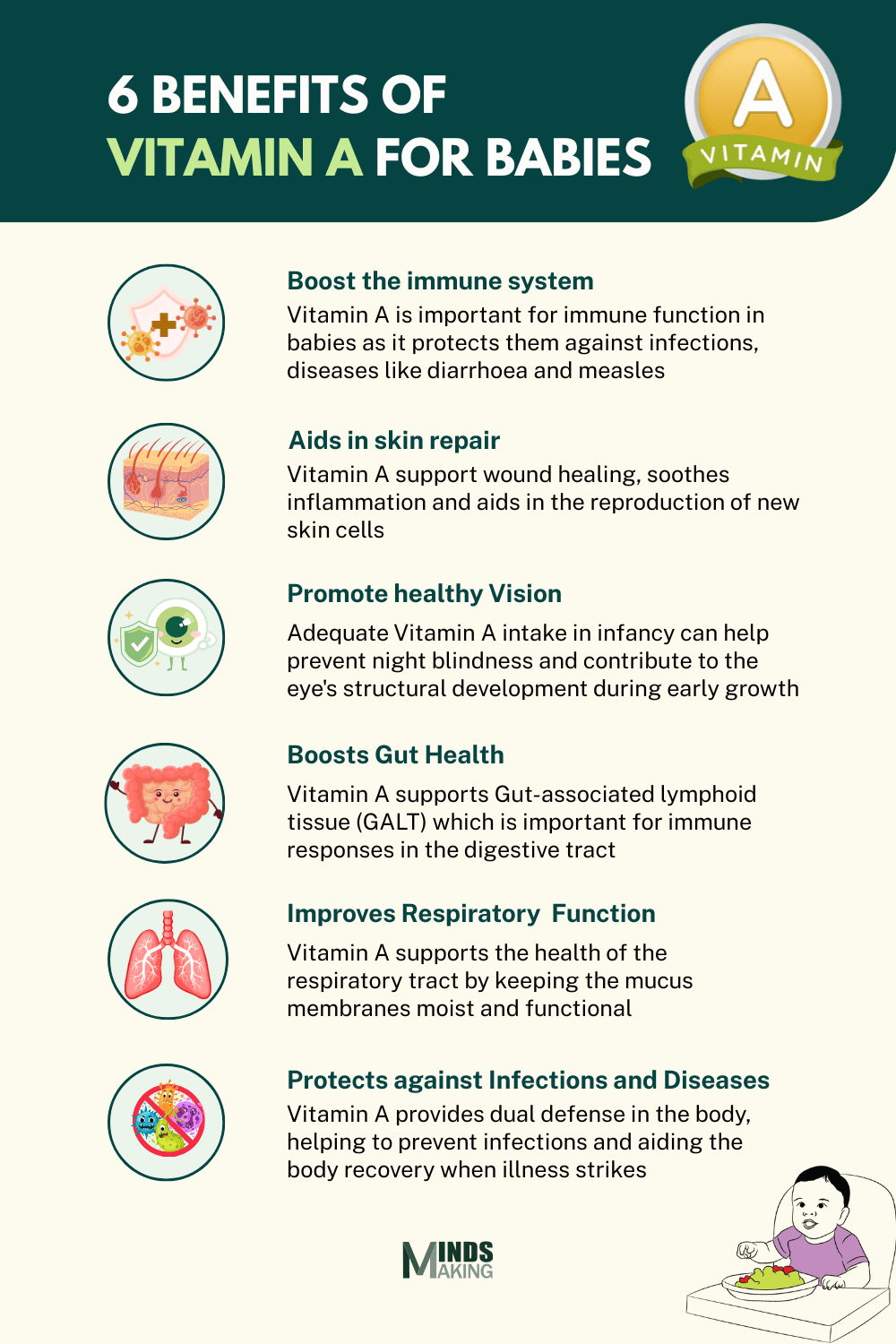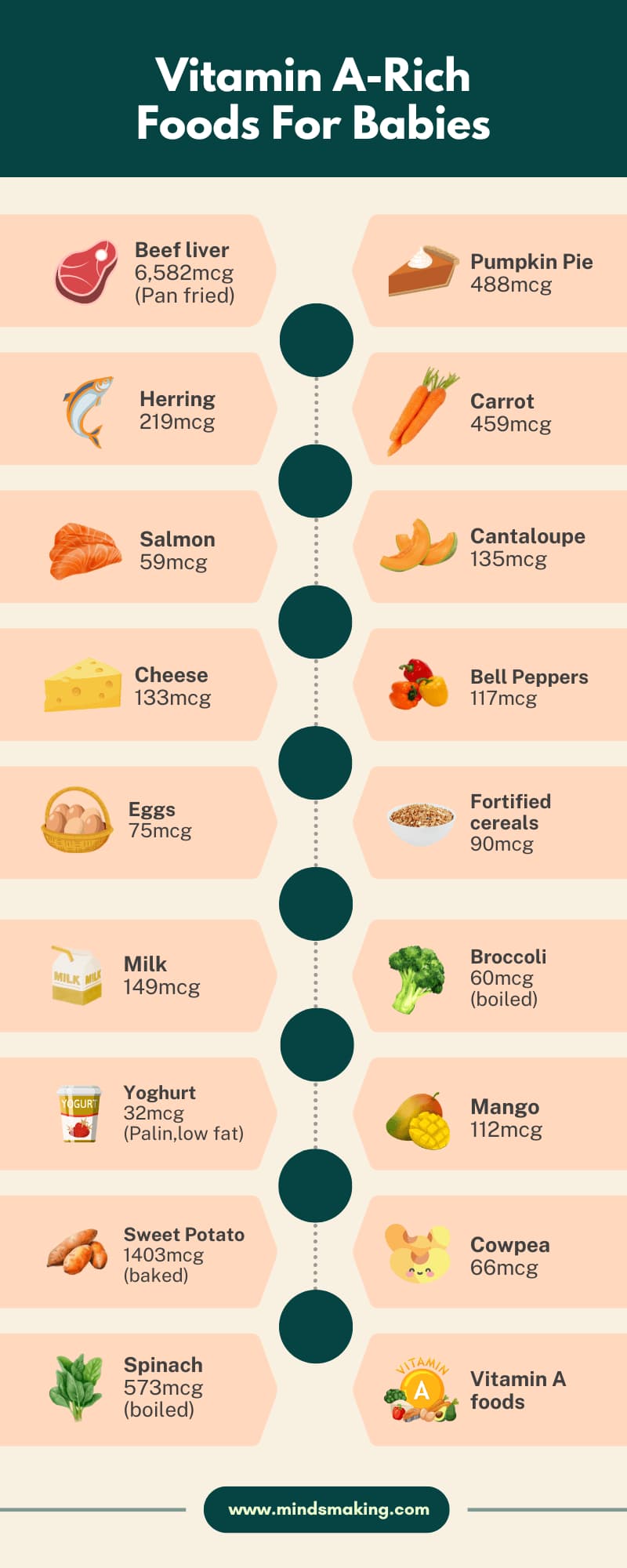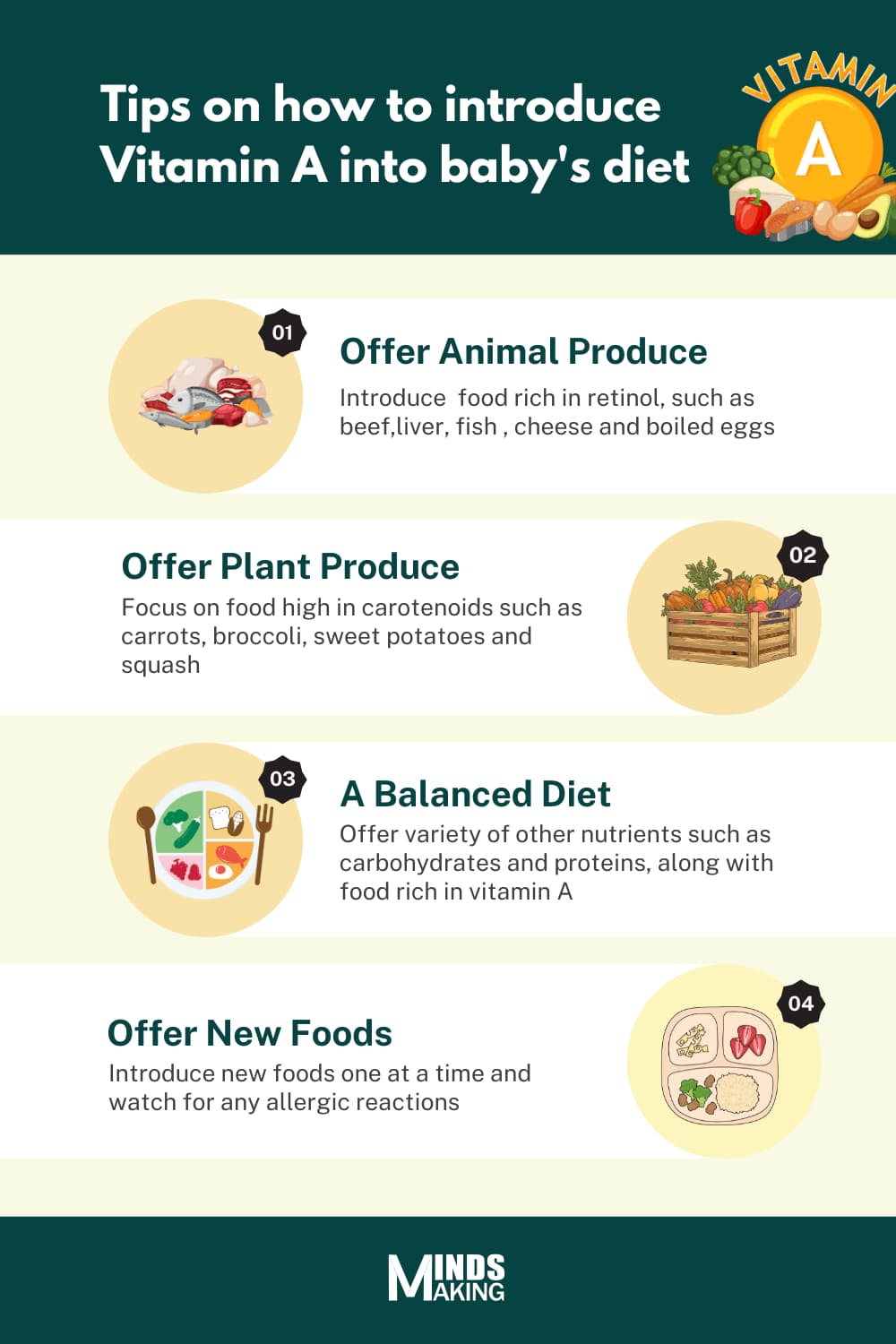Vitamin A for Babies
getty image

Written by Mindsmaking Medical Writer
Fact Checked by Mindsmaking Professionals
22nd, December, 2025
Wondering if your child is getting enough vitamin A? Learn how important Vitamin A is for babies, vitamin A sources, daily Vitamin A recommendation, and signs of vitamin A deficiency in babies.
Vitamin A is an essential nutrient for babies' early development. This fat-soluble nutrient cannot be produced naturally in the body and must be included in their daily diet.
Vitamin A is crucial for babies' healthy vision, boosts the immune system, aids skin repair, and supports development [1]. This vitamin can be obtained from breast milk, formula, and most organic foods, including animal and plant sources.
If you are concerned about your baby's daily vitamin A intake and wonder if they are getting enough, especially when transitioning to solids or dealing with a picky eater, this article will provide insights into the daily recommended intake, sources of vitamin A, its benefits, and the risks of vitamin A deficiency.
Key Takeaways
Vitamin A supports eye health, boosts immunity, and promotes cell growth in babies. Without it, babies are at higher risk for infections, vision problems, and developmental delays.
The daily recommended vitamin A intake for babies is 400 mcg for babies aged 0–6 months, 500 mcg for babies 7–12 months, and 300 mcg for toddlers 1 - 3 years. Exceeding the recommended daily intake can lead to an overdose in babies.
Vitamin A supplements are given to babies at risk of vitamin A deficiency and can only be recommended by a pediatrician. The forms of vitamin A supplements include multivitamin syrups, chewable gummies, oral drops, and tablets.
Dry eyes, slow or stunted growth, frequent colds and infections, and dry or itchy skin are signs of a vitamin A deficiency in babies.
Vitamin A-rich foods include breast milk, formula, sweet potatoes, carrots, spinach, pumpkin, eggs, beef liver, fish, broccoli, bell peppers, cheese, milk, and mangoes.
Focus on offering your baby a balanced diet, not just vitamin A-rich foods, for optimal health.
Why Do Babies Need Vitamin A?
Vitamin A is important for baby development and survival. According to the World Health Organization (WHO), Vitamin A deficiency is one of the leading causes of preventable blindness in children and contributes to increased infant mortality in low-income countries.
Studies confirm that Vitamin A supports cellular growth, enhances the formation of the eye's photoreceptor cells, and strengthens the immune system. It enables white blood cells to function effectively and supports the mucosal integrity of the respiratory and digestive tracts [4].
Vitamin A is also essential for the development of epithelial tissues in the body. These tissues are needed to maintain and rejuvenate the skin and internal organs.
Vitamin A supports your child’s respiratory tract, reduces the risk of developing infections, and accelerates wound healing[3].
Benefits of Vitamin A for Babies
Vitamin A helps support vision, boosts the immune system, and protects against infections. Here are some more benefits of vitamin A for your little one[1]:
Boosts the immune system: Vitamin A is important for immune function in babies. Adequate vitamin A in babies helps boost the production of white blood cells, particularly lymphocytes, responsible for attacking and neutralizing disease-causing pathogens.
Studies show that vitamin A supplementation in babies can significantly reduce infant mortality rates by protecting them against infectious diseases like diarrhea and measles.
Aids in skin repair: The skin is a rapidly regenerating organ that relies on vitamin A for repair and renewal. Vitamin A supports wound healing, soothes inflammation, and aids in the reproduction of new skin cells[14].
A study showed that infants with sufficient vitamin A levels healed faster from common skin irritations, such as eczema and diaper rash, compared to those with marginal or deficient levels.
Promotes healthy vision: According to the World Health Organization (WHO), adequate vitamin A intake in infancy can help prevent night blindness and other severe ocular conditions, such as xerophthalmia (dry eyes) and corneal damage[4].
Vitamin A in babies contributes to the structural development of the eye during early growth, ensures that their eyes can adapt to light changes, and helps develop proper vision tracking.
Boosts gut health: The gut is a home to a large portion of the immune system, and vitamin A helps maintain the health and integrity of the intestinal wall. This barrier is crucial for nutrient absorption and protecting against harmful bacteria or toxins[13].
A study highlighted that vitamin A supports gut-associated lymphoid tissue (GALT), which is important for immune responses in the digestive tract[4]. Babies who are just beginning to build their gut microbiome can benefit from vitamin A, which helps balance beneficial bacteria and strengthens the gut wall, reducing the risk of gastrointestinal infections and diarrhea.
Improves respiratory function: Vitamin A supports the health of the respiratory tract by keeping the mucous membranes moist and functional. This is important for filtering out pathogens of viral infections and allergens[3].
Adequate vitamin A supplementation helps reduce the risk of respiratory diseases like bronchopulmonary dysplasia (BPD) in infants, especially preterm babies with underdeveloped lungs.
Protects against infections and diseases: Vitamin A provides a dual defense in the body, helping to prevent infections and aiding the body's recovery when illness strikes. Its role in immune function allows babies to resist common infections like measles, pneumonia, and diarrhea[13].
Additionally, a study established a direct correlation between Vitamin A supplementation intake and disease resistance in children. It showed that infants with adequate vitamin A levels had lower incidences of diseases like measles, diarrhea, and respiratory infections. In high-risk settings like preterm infants, Vitamin A supplementation significantly reduced mortality rates.
Mindsmaking

How Much Vitamin A is recommended for Babies?
The daily vitamin A recommendation for babies varies based on age. According to the National Institute of Health (NIH), the recommended daily Vitamin A intake is:
Vitamin A naturally occurs in most foods and can be included easily in your baby's diet before considering pediatric vitamin supplements. Vitamin A supplements in children should only be introduced under the guidance of a pediatrician when it is determined that your child isn't getting enough vitamins from their diet.
The American Academy of Pediatrics (AAP) advises that exceeding recommended amounts can result in toxicity and overdose. Symptoms of an overdose could include nausea, vomiting, irritability, and liver damage in severe cases. That is why it is important to stick to the recommended daily limit, as Vitamin A should never be given in excess to babies without medical supervision.
Read This Next
No posts available
Should Babies be Given Vitamin A Supplements?
Health professionals usually prescribe pediatric vitamin supplements to babies at risk of vitamin A deficiency, especially babies in low-income countries. Evidence from a research study showed that Vitamin A supplementation reduced mortality by up to 24% in children aged 6–59 months living in low and middle-income countries[6].
Ideally, Vitamin A supplements are given when it is determined that a child isn't getting adequate vitamin A from their daily meals and is showing signs of a vitamin A deficiency.
When Vitamin A levels in your baby's nutrition are inadequate or your child shows signs of a deficiency, such as night blindness, dry eyes, and dry skin, it is important to take your child to a pediatrician for an evaluation and possible vitamin supplementation.
Pediatricians usually consider the child's age and health status when prescribing vitamin A supplements for children. Types of pediatric vitamin supplements include Retinol (Active Vitamin A) and Provitamin A (beta-carotene), which can come in forms such as[3]:
- Multivitamin Syrups
- Liquid drops
- Chewable gummies
- Tablets.
What are the Signs of Vitamin A Deficiency in Babies?
Dr. James O’Donovan, a doctor and health researcher, explained in his video that constantly battling dry eyes and squinting your eyes in the dark are key signs of vitamin A deficiency. These signs occur because Vitamin A is essential for maintaining healthy mucous membranes and boosting immune function to fight off colds and infections.
Dr James says that prolonged vitamin A deficiency in babies can lead to heart, skin, vision, lungs, and immune system complications. Vitamins are super important to Infant health, and lacking nutrients like Vitamin A can destabilize their overall wellness.
Some early symptoms of vitamin A deficiency in babies include:
Xerophthalmia: This is simply eye dryness. It is one of the earliest and most common signs of vitamin A deficiency. It begins with dryness of the conjunctiva, the soft membrane covering the white part of the eye, and can progress to more severe conditions, such as foamy patches on the white part of the eye.
Other signs include an inability to produce tears and white, scaly patches on the cornea.
Delayed Visual Development: Vitamin A is important for proper visual development in infants and young children. Vitamin A deficiency in babies can delay eye maturation, making it harder for them to track movement, focus on objects, or respond to visual stimuli.
Frequent Colds or Infections: One important benefit of vitamin A is its support for the immune system's fight against infections. When a child has a Vitamin A deficiency, their immune system becomes weakened, making them more prone to frequent viral infections and colds.
Delayed or Stunted Growth: Vitamin A is important for cell and bone development in babies. When an infant or toddler lacks vitamin A, it can result in slower physical development, poor weight gain, and stunted height.
Dry, flaky, and itchy skin: Dry and patchy skin is one of babies' earliest signs of vitamin A deficiency. Without adequate vitamin A, babies' bodies cannot maintain healthy epithelial cells, which could lead to dryness, flakiness, or rough patches, particularly on the arms, legs, and face. In some cases, children may also experience itching or irritation in those areas of the body.
Night Blindness: If you notice a difficulty in your child seeing in low light or night-time conditions, there's a high chance they have night blindness. The eyes struggle to adjust without enough vitamin A, resulting in poor night vision.
Vitamin A protects the cornea (the outer part of the eye) and produces rhodopsin, a pigment in the retina that helps the eyes adjust to darkness[12].
Poor wound Healing: Vitamin A is important for repairing and regenerating skin and mucosal tissues in the body. Vitamin A deficiency impairs the body’s ability to heal wounds and fight off skin infections[1]. Cuts, scrapes, or rashes may take longer to heal and are more prone to infection in individuals with vitamin A deficiency.
Babies who fall under High-risk groups, such as preterm babies, babies with low birth weight, babies with congenital or genetic problems, and infants with digestive conditions, stand at high risk of developing vitamin A deficiency. It is essential to consult a healthcare provider to determine if Vitamin A supplements are necessary for your child.
Vitamin A Food Sources for Babies
Studies show that Vitamin A also occurs naturally in breast milk, which is adequate for a baby's development for the first 12 months of life [9]. Most baby formulas are also fortified with vitamin A to ensure adequacy in baby nutrition.
Natural foods, including plant-based and animal-based, are the primary sources of vitamin A for babies on solids. Plant-based foods, such as leafy greens, red and orange-colored foods, and fruits, produce a type of vitamin A called provitamin A (beta-carotene). On the other hand, Animal-based foods like chicken, beef liver, eggs, and cheese produce a type of vitamin A called Retinol.
Some Vitamin A-rich foods include [3]:
- Beef liver - 6,582 mcg ( pan fried)
- Herring - 219 mcg
- Tuna - 20 mcg (Canned in oil)
- Salmon - 59 mcg
- Cheese - 133 mcg
- Eggs - 75 mcg
- Milk - 149 mcg
- Yoghurt - 32 mcg (plain, low fat)
- Sweet potato - 1,403 mcg (baked)
- Spinach - 573 mcg (boiled)
- Pumpkin pie - 488 mcg
- Carrot - 459 mcg
- Cantaloupe - 135 mcg
- Bell peppers - 117 mcg
- Fortified cereals - 90 mcg
- Broccoli - 60 mcg (boiled)
- Mango - 112 mcg
- Cow pea - 66 mcg
- Baked beans - 13 mcg
mindsmaking

Tips on How to Introduce Vitamin A in a Baby's Diet
It is important to focus on maintaining a balanced diet that contains not just vitamin A, but also other essential nutrients like carbohydrates, minerals, fats and oils, proteins, and other Vitamins. This is needed for healthy baby nutrition.
Below are tips on introducing Vitamin A sources in a baby’s diet safely:
- Introduce retinol-rich foods, such as beef liver, fish, cheese, and boiled eggs.
- Focus on foods high in carotenoids, such as carrots, broccoli, sweet potatoes, and squash.
- Offer a variety of other nutrients, such as carbohydrates and proteins, along with foods rich in vitamin A.
- Introduce new foods one at a time and watch for an allergic reaction.
Some parents tend to avoid introducing allergenic foods that contain vitamin A to their babies due to the fear of an allergy. Foods such as fish, milk, and eggs. However, Studies show that introducing allergenic foods to high-risk infants as early as 4 to 6 months old can help prevent them from becoming allergic to those foods[10].
mindsmaking

Frequently Asked Questions
Can babies get enough Vitamin A from breast milk?
Yes! It contains high concentrations of retinol, a form of vitamin A that is vital to support newborns' immune system and eye development. Breast milk is very rich in Vitamin A, especially colostrum (the first milk produced after delivery). Studies show that the vitamin A concentration in breast milk during the first two weeks of lactation after child birth is double in concentration than after one month. It is even higher in preterm milk than in term milk during the first several months [9]. However, it is also important to note that the nursing mother's nutrition is a determinant of the vitamin A levels in breast milk. If a breastfeeding mother is deficient in Vitamin A, her milk might not contain enough vitamin A to support her baby's needs.
Are Vitamin A supplements safe for newborns?
Vitamin A supplements are safe for newborns when prescribed by a pediatrician and under strict medical supervision. It is important to follow daily dosage recommendations as excess vitamin A supplementation can lead to toxicity or overdose [11]. Some symptoms of an overdose include vomiting, nausea, irritability, sensitivity to light, and, in severe cases, liver damage. That is why health professionals advise turning to natural foods, such as breast milk and formula, first before considering supplements.
Which fruit is high in Vitamin A?
Mangoes contain high vitamin A levels. It contains Provitamin A, also known as Beta-carotene, which is a form of vitamin A obtained from plant-based foods. For babies over 6 months who are starting solids, you can introduce vitamin A-rich foods, such as mango puree and mango slices, to boost their overall health. Other sources of vitamin A include papaya, apricots, and squash. Vegetables and leafy greens, such as carrots, sweet potatoes, broccoli, and spinach, are also great sources of vitamin A for babies.
Are premature babies at higher risk of Vitamin A deficiency?
Yes! Premature babies are more susceptible to having a vitamin A deficiency compared to full-term babies. A paper published by the National Institute of Health says that preterm babies are born with low liver stores, and their plasma concentrations of retinol often remain low throughout the first year of life [3]. It is important to prioritize feeding your baby vitamin A-rich foods and to keep up with pediatric appointments, as well as to monitor your baby for signs of vitamin A deficiency.
Do all babies need Vitamin A supplements?
No! Not all babies require vitamin A supplements. Pediatric vitamin supplements are usually prescribed by health professionals to babies at risk of vitamin A deficiency, especially babies in low-income countries [6]. In most developed countries, babies receive adequate Vitamin A from breast milk, fortified formula, and solid foods. Vitamin A supplements are not needed unless symptoms of a deficiency are detected.
What foods are rich in Vitamin A for babies?
Foods rich in Vitamin A for babies include animal products like Beef liver (6,582 mcg), milk (149 mcg), yogurt (32 mcg), cheese (133 mcg), eggs (75 mcg), salmon (59 mcg), and herring (219 mcg) [3]. Plant-based products like sweet potatoes (1,403 mcg), carrots (459 mcg), spinach (573 mcg), broccoli (60 mcg), Cantaloupe (135 mcg), bell peppers (117 mcg), and mangoes (112 mcg) are also good vitamin A sources for your baby.
Can too much Vitamin A be harmful to babies?
Yes! Excessive Vitamin A intake in babies, especially from supplements, is harmful as it can lead to toxicity or overdose. That's why experts advise turning to natural sources of vitamin A before considering supplements. Signs of an overdose include vomiting, irritability, and drowsiness. In severe cases, a prolonged overdose can lead to a swelling of the soft spots on the baby’s head (fontanelles), impair liver function, and delay normal growth and development.
Was this article helpful?
How many stars are you giving this article?
Leave a comment
Your email address will not be published.